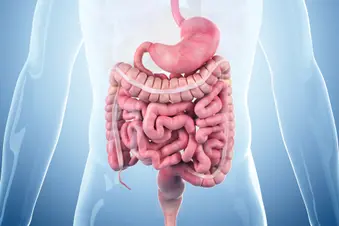
When you have iron-deficiency anemia, low iron leads to a lack of red blood cells to carry oxygen to various parts of your body. Sometimes a gastrointestinal (GI) disorder causes this type of anemia. GI problems can make it hard for your body to absorb iron and other nutrients from food.
It’s a good idea to know which common GI disorders can lead to iron-deficiency anemia. If you have one of these conditions, you’ll need to be on the lookout for symptoms of low iron.
Celiac disease. This autoimmune condition damages the inner lining of your small intestine. Exposure to gluten triggers flare-ups of inflammation that damage your small intestine. Specifically, the disease damages your villi – tiny projections that line the inner wall of the small intestine. When villi don’t work properly, your body can’t absorb nutrients, including minerals like iron, from food.
Inflammatory bowel disease. The two types of inflammatory bowel disease, Crohn’s disease and ulcerative colitis, cause inflammation and ulcers in your digestive tract. Ulcers bleed, and this blood loss can lead to iron deficiency. Not only do you lose iron, but the condition can also make it hard for your body to replace that iron. You might not fully absorb nutrients from food, including iron, because of the damage to your gut.
Diverticulitis. In this common condition, small sac-like pouches form in the lining of the colon and become inflamed. The inflammation can cause intestinal bleeding that, about a quarter of the time, leads to iron-deficiency anemia.
Hiatal hernia. With this type of hernia, the upper part of your stomach bulges through the large muscle that separates your abdomen and chest. If the piece of your stomach is large enough, it causes food and acid to back up in your esophagus and leads to heartburn. It can also create sores that lead to invisible, ongoing blood loss and raise your risk for iron-deficiency anemia.
Heartburn. The condition itself doesn’t cause anemia, but the medicine you take for it might. Proton-pump inhibitors, a common over-the-counter medication for heartburn, block iron absorption and, over time, can lead to iron deficiency.
Bariatric or weight loss surgery. Iron-deficiency anemia is much more common after a gastric bypass than after other weight loss procedures such as a sleeve gastrectomy or a gastric band. Postmenopausal women are at highest risk. More than half of them develop this condition after gastric bypass surgery. After a gastric bypass procedure, the food you eat bypasses the first part of your small intestine so that you don’t get as many calories from it. But that’s also the part of your small intestine that absorbs all the iron from foods. After this surgery, you may need a high-iron supplement. The amount of iron in a standard multivitamin might not be enough to prevent anemia.
Stomach ulcers. An ulcer is an open sore, usually caused by acid. Many people with stomach ulcers don’t have any symptoms at all. But ulcers can bleed. Sometimes, blood loss is so slow that you don’t get a diagnosis until you develop anemia. Faster bleeding often shows up in your poop. It might look jet black, sticky, or as streaks of blood. Ulcers have a few possible causes. The bacterial infection H. pylori is one. Overuse of nonsteroidal anti-inflammatory drugs (NSAIDs), such as aspirin, ibuprofen, or naproxen, is another.
What to Do
If you have any of these GI conditions, it’s very important that you watch for symptoms of iron-deficiency anemia. These include:
- Dizziness
- Fatigue
- Headaches
- Shortness of breath
- Paleness
- Brittle nails
- Cold hands and feet
- Restless legs
- Cravings for non-food items like ice and dirt
If you notice any of these signs, tell your doctor. They will run lab tests to check your red blood cell size and color, your hemoglobin, and ferritin, a protein that helps store iron in your body.
If you have iron-deficiency anemia, the treatment depends on the cause. Your doctor will need to know what’s behind your anemia. If you have symptoms such as blood in your stool, chronic bloating, constipation, diarrhea, inability to hold your stool, heartburn, stomach pain, or unexplained weight loss, let your doctor know right away. They may do two tests to help determine if a GI problem is the underlying cause:
- Endoscopy. A doctor passes a thin, lighted tube with a video camera attached down your throat and into your stomach to check for sources of bleeding.
- Colonoscopy. A doctor inserts a thin, flexible tube with a video camera attached into your colon to look for lower intestinal sources of bleeding.
Treatment usually includes iron supplements. If your GI tract doesn’t absorb iron well, you might need IV iron infusions.
It’s very important to get treatment for iron deficiency. If you don’t, it can lead to complications such as a rapid or irregular heart rate, heart enlargement, and even heart failure. Pregnant women with iron deficiency may have higher risk of preterm delivery and low-birth-weight babies.
If you have one of these GI conditions, keeping it under control can help keep your iron at a healthy level, too.
Show Sources
SOURCES:
Canadian Society of Intestinal Research: “Celiac Disease,” “Inflammatory Bowel Disease,” “Diverticular Disease,” “Iron-Deficiency Anemia.”
World Journal of Gastroenterology: “Anemia and iron deficiency in gastrointestinal and liver conditions,” “Paraesophageal hernia and iron deficiency anemia: Mechanisms, diagnostics and therapy.”
Toxicology Letters: “Proton pump inhibitors block iron absorption through direct regulation of hepcidin via the aryl hydrocarbon receptor-mediated pathway.”
UC San Diego Health: “Iron Deficiency After Gastric Bypass Surgery.”
American College of Gastroenterology: “Peptic Ulcer Disease.”
Mayo Clinic: “Iron-Deficiency Anemia.”